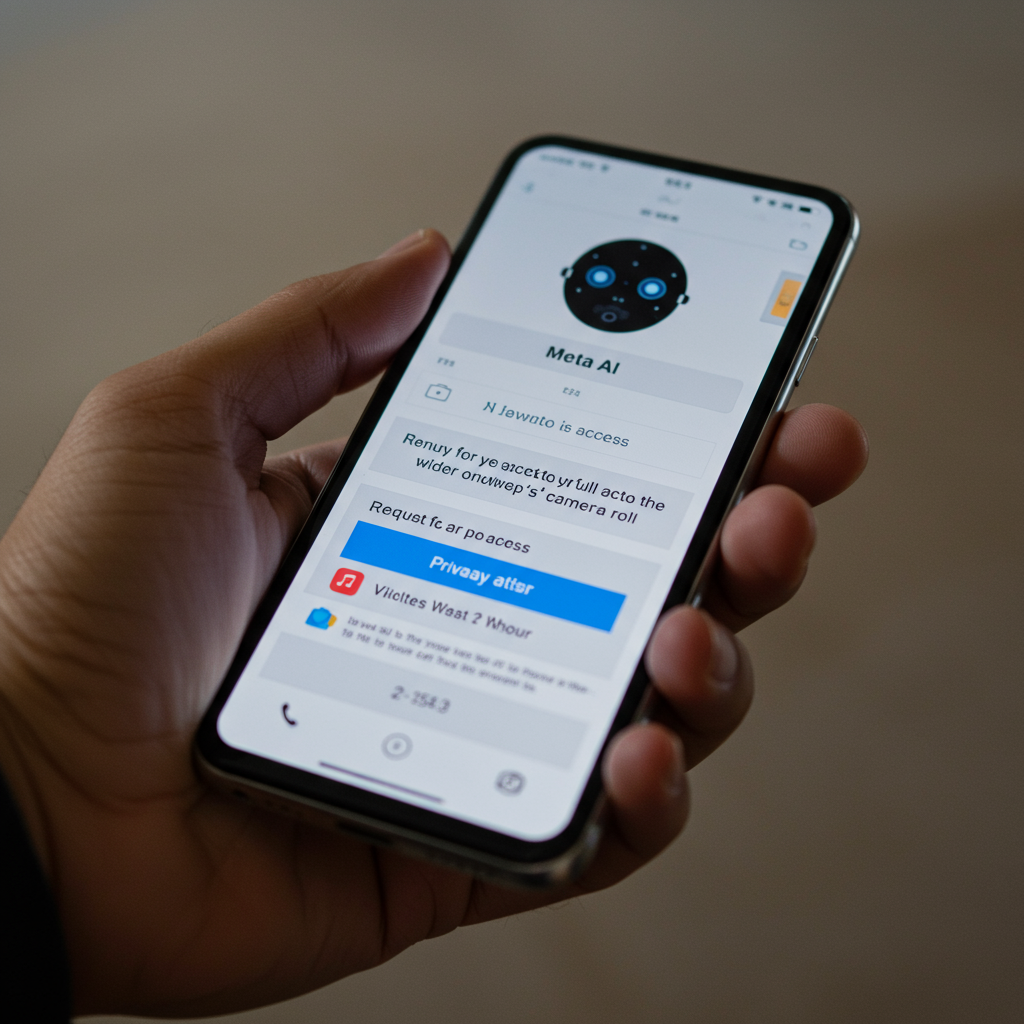Facebook users creating a new Story are encountering a concerning pop-up. The social media giant is requesting permission to access your device’s entire camera roll for its Meta AI features, promising to generate creative suggestions like collages and AI-enhanced restylings. However, accepting this seemingly innocuous request involves granting Meta significant access to your private photos and videos, uploading them to their servers on an ongoing basis and agreeing to broad AI terms with potential privacy implications that extend far beyond simple photo suggestions.
This development represents a new level of data access for Meta, moving beyond publicly shared content to tap directly into users’ personal, unshared media libraries. While Meta frames it as a feature to make sharing easier, privacy advocates and tech analysts are raising alarms about the scope of the permission and the potential uses of this sensitive data.
What Facebook is Asking For: The “Cloud Processing” Opt-In
When you next go to create a Facebook Story, you might see a new screen appear. This prompt specifically asks if you want to “Allow cloud processing to get creative ideas made for you from your camera roll.” Clicking “Allow” here isn’t just enabling a simple on-device feature; it triggers a process that involves uploading your private photos and videos from your phone to meta’s cloud infrastructure.
This process isn’t a one-time event. The pop-up and Meta’s documentation indicate that media from your camera roll will be uploaded to Meta’s servers on an “ongoing basis.” This continuous upload is based on various factors, including the time photos were taken, their location data, or detected themes within the images. The stated purpose is to allow Meta AI to sift through this personal library and present you with ready-made ideas for content you might want to share on the platform.
How Meta AI Plans to Use Your Private Photos
Once your camera roll media is uploaded to Meta’s servers via this “cloud processing” feature, Meta AI gets to work analyzing it. The company states this analysis is done to generate specific types of suggestions aimed at making it easier for you to create and share content. These suggestions include:
Collages and Recaps: Automatically assembling groups of related photos into compilations.
AI Restylings: Applying artistic filters or transformations using AI (like the example of a wedding photo turned into anime).
Themed Collections: Organizing photos based on events like birthdays, holidays, graduations, or even common elements like pets or specific locations.
To achieve this, Meta AI analyzes the details within your photos and videos. This includes using information like the dates and times the media was captured, GPS location data embedded in the files, and importantly, identifying the presence of people and objects within the images. The terms also specifically mention the analysis of “facial features.”
Meta’s Assurances vs. The Reality of Their AI Terms
Meta provides some assurances in the opt-in prompt and related documentation. They claim that the suggestions generated from your camera roll will only be shown to you, the user, and will not be used for advertising purposes. A company spokesperson has also reportedly stated that in this specific test of the feature, the media is not being used to improve or train Meta’s general AI models, but only to improve the suggestions offered within the feature itself.
However, these specific assurances regarding the current test run up against the broader permissions granted by Meta’s general AI Terms of Service, which users must agree to by opting into this feature. The Meta AI Terms are reportedly quite broad. They permit the analysis of uploaded media, including facial features, for purposes like summarizing content, modifying images, and generating new content. More concerningly, these terms state that Meta’s AI has the right to “retain and use” any personal information shared as “Content” to personalize AI outputs.
This creates a significant point of ambiguity. While Meta says the photos in this test aren’t for model training, the overall AI Terms seem to grant Meta the right to analyze and potentially retain data classified as “Content.” It’s unclear if the private camera roll photos uploaded via “cloud processing” are completely exempt from this broader definition or future use under the existing terms. Granting access essentially puts your private media under the purview of these expansive AI terms.
Major Privacy Concerns Raised by Camera Roll Access
Granting an AI provider continuous, automated access to your entire camera roll is inherently risky, and Meta’s history adds another layer of concern. Your camera roll isn’t just vacation photos; it often contains highly sensitive and private information, including:
Sensitive Personal Images: Photos of children (including potentially sensitive ones like bath photos), intimate photos of adults, medical images, or photos related to personal health.
Screenshots: These can contain banking details, private conversations, passwords displayed temporarily, work information, or sensitive search queries.
Biometric Data: Accessing photos and analyzing “facial features” involves collecting and processing biometric data. This directly conflicts with strict state privacy laws in places like Illinois and Texas, which regulate the collection and use of such data. Meta itself includes warnings about not sharing photos containing people from these states unless authorized, yet this feature allows unfettered access to potentially millions of photos from those locations within users’ camera rolls.
Human Review: Meta’s terms reserve the right to subject any content to “automated or manual (i.e. human) review.” While this is often framed around safety checks, there’s nothing explicitly stating that sensitive camera roll photos uploaded for AI suggestions would be exempt from potential human oversight under certain circumstances.
Compared to other services like Apple Photos, which reportedly perform much of their AI analysis (like face recognition and object detection) locally on the device without uploading your entire library to the cloud, Meta’s approach involves centralizing this highly personal data on their servers. Google Photos also uploads photos to the cloud and uses AI, but Meta’s specific history with data handling and privacy controversies makes this level of access particularly concerning for many users.
Furthermore, there’s a concern that even if you opt out, photos you share with others who have opted in could potentially be analyzed by Meta through their access to that person’s camera roll.
The Actionable Step: How to Disable the Feature
If you encounter this prompt, the safest immediate action, based on privacy concerns, is to select “Don’t allow.”
If you have already opted in, or if you want to check whether the feature is enabled, you can disable it. This option is buried within Facebook’s settings. Here’s how to find it:
- Open the Facebook app.
- Navigate to Settings & Privacy, then Settings.
- Scroll down to the Preferences section.
- Look for and tap on Camera roll sharing suggestions.
- On this screen, you will find toggles. One may be for suggesting photos when browsing the app (which might use local data or previously uploaded data). The crucial toggle to disable is the one specifically for “Get creative ideas made for you by allowing camera roll cloud processing” (or similarly worded). Toggle this option off.
According to Meta’s documentation, disabling this setting will also initiate the removal of any unpublished photos that were uploaded to the cloud via this feature within approximately 30 days. Keeping this feature disabled ensures your private camera roll remains on your device and outside of Meta’s continuous cloud processing.
Context: Meta’s Broader AI Push
This move to access private camera rolls comes as Meta is heavily investing in its generative AI capabilities. Training advanced AI models requires immense datasets. Meta has already used publicly available data from Facebook and Instagram posts since 2007. Accessing the vast trove of unshared photos and videos on users’ devices could provide a richer, more diverse, and deeply personal dataset than previously available. While Meta claims the current test doesn’t use the data for model training*, the expansive nature of their AI Terms and the potential future uses of such data remain significant concerns.
Ultimately, Facebook’s request for camera roll access via “cloud processing” presents users with a trade-off: potentially convenient AI-generated photo suggestions in exchange for uploading their entire private media library to Meta’s servers under terms that allow broad analysis and potential future use. Understanding the implications is crucial before granting this unprecedented level of access.
Frequently Asked Questions
What is Facebook’s “cloud processing” and why does it need my camera roll?
Facebook’s “cloud processing” is a feature being tested that requires uploading your photos and videos from your phone’s camera roll directly to Meta’s servers. Facebook states it needs this access to use Meta AI to analyze your private media and generate personalized “creative suggestions” for Stories or posts. These suggestions could include automatic collages, AI-enhanced photo styles, or themed photo collections based on events or dates found in your camera roll.
How can I turn off Facebook’s camera roll access for Meta AI suggestions?
If you have enabled the “cloud processing” feature or want to ensure it’s off, you can disable it in your Facebook settings. Go to Settings & Privacy > Settings. Scroll down to Preferences and tap on “Camera roll sharing suggestions.” On this screen, toggle off the option related to “cloud processing” or “Get creative ideas made for you by allowing camera roll cloud processing.” Disabling this setting should initiate the removal of previously uploaded camera roll photos from Meta’s cloud within about 30 days.
Should I allow Facebook to access my camera roll for AI photo suggestions?
Granting Facebook access to your camera roll for AI suggestions involves uploading your entire private photo and video library to Meta’s servers on an ongoing basis. While Meta claims suggestions are private and data isn’t used for ads or, currently, for AI model training, you agree to broad Meta AI Terms that permit analysis, including facial features, and potential retention of your media data. Given Meta’s history and privacy concerns regarding sensitive photos, biometric data laws, and the potential for future use, many privacy experts recommend declining this request and keeping the feature disabled.




